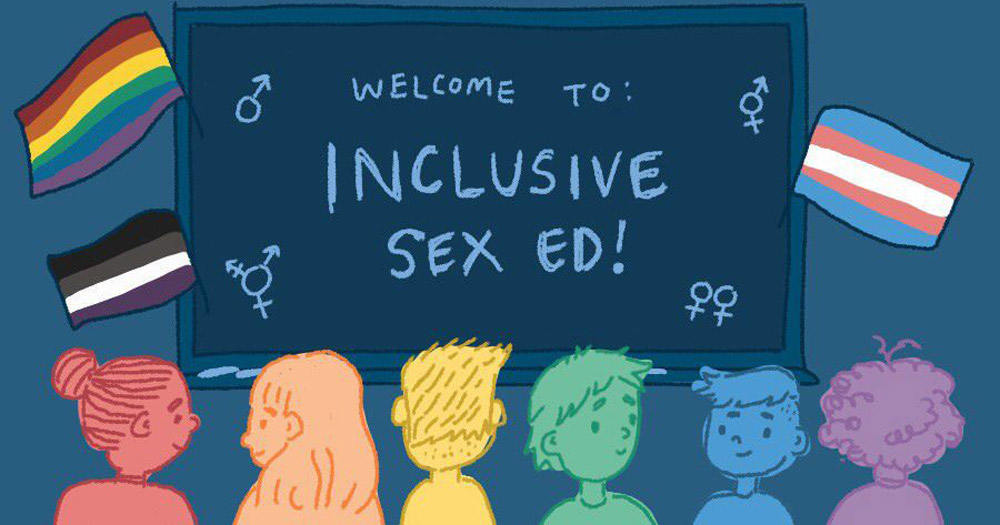“Let’s create a school system where every young person has access to scientifically factual, up-to-date information about sexuality, sexual orientation, gender identity, STI’s, safe sex, and consent.”
Shame, mixed messaging, and too often silence surround the areas of sexuality and relationships in many classrooms across Ireland. Irish young people receive inadequate information relating to sexuality, safe sex, STI’s, consent, and reproduction. In many schools, young people receive incomplete or no information on being LGBT+, despite ‘Growing up LGBT’ being part of the SPHE (Social Personal Health Education) and RSE (Relationships and Sex Education) curriculum. Growing Up LGBT: A Resource for SPHE and RSE was developed by the Department of Education and Skills and the Health Service Executive through the Social, Personal and Health Education Support Service, in conjunction with GLEN (Gay and Lesbian Equality Network) and BeLonG To Youth Services in 2013.
Young LGBT+ people have been calling for improvements to sex education for many years now. The issue has been raised in BeLonG To’s regular surveys of young people who attend our services, in the consultations for the upcoming LGBT+ Youth Strategy, and in GCN’s Budding Burning Issues survey. They are frustrated with the lack of information available to them relating to LGBT+ issues and are eager to see significant improvements.
Support For Schools and Teachers
I am delighted that Minister for Education and Skills, Richard Bruton TD has announced a review of RSE in Irish second level schools. It is clear that he is committed to an education system that supports young people to make healthy and respectful choices about their bodies and relationships. RSE and SPHE can help equip our young people with knowledge around sexual orientation, gender identity, safe sex and remove the stigma shrouding LGBT+ topics in a classroom setting, but schools and teachers need to be supported to ensure it is taught.
Updating RSE resources is only one part of what needs to happen so that comprehensive information on sexual orientation, gender identity, and coming out can be provided to young people. In the absence of a staff member or leadership committed to LGBT+ issues in a school, this content is not shared with young people. Engagement with sexuality education must not be optional or determined by the ethos of a school board. Teachers and other staff in schools need training, and class time for RSE covering LGBTI+ issues must be timetabled for both junior and senior cycles in every school.
The Objective Sex Education Bill 2018, published by Ruth Coppinger TD this week, sets out to remodel the content and implementation of sex education calling for prioritisation of factual, accurate sex information embracing LGBT+ identities, over the religious ethos of a school. According to 2016 UNESCO research, comprehensive sexuality education has positive effects including increasing knowledge about different aspects of sexuality, behaviour, and risks of pregnancy or HIV and other STIs. Sex education results in reduced risk-taking behaviour and increased use of condoms and contraception.
A Step Forward
We need to transform how schools view and engage with sex education and LGBT+ issues. A step forward would be the inclusion of LGBT+ issues in the core RSE curriculum, but real change means the integration of LGBT+ issues across all relevant subjects. LGBT+ identity cannot be confined to one book and one subject. Research shows that 70% of LGBT+ young people feel unsafe at school. Feelings of isolation and not being accepted can have serious impacts on the mental health of our young people. According to the 2016 LGBTIreland Report, LGTB+ young people are three times more likely to attempt suicide, and two times more likely to self-harm than their non-LGBT+ friends. Supporting our young people towards positive mental health should not be optional. It is too important.
Back in 2015, Ireland said yes to marriage equality. We now need our schools to say yes to the inclusion of LGBT+ identities in a real and meaningful way. Let’s create a school system where every young person has access to scientifically factual, up-to-date information about sexuality, sexual orientation, gender identity, STI’s, safe sex, and consent. Learning about these topics is an essential life skill, and vital to realise young people’s right to health and well-being.
Moninne Griffith, Executive Director BeLonG To Youth Services. Find out more about BeLonG To here
© 2018 GCN (Gay Community News). All rights reserved.
